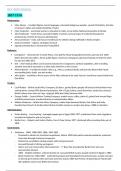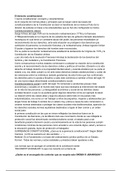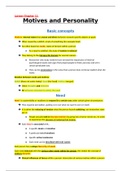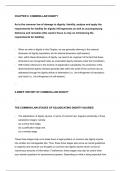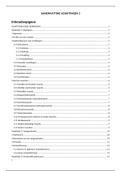KEY INDIVIDUALS
1857-1914:
Missionaries:
Mary Slesser – travelled Nigeria, learnt languages, educated indigenous peoples, spread Christianity, the idea
of women’s rights and ended infanticide of twins
Mary Carpenter – promoted women’s education in India, set up Indian National Association in Britain
John Mackenzie – South Africa, promoted rights of natives, pressured gov to make Bechuanaland a
protectorate of which he became administrator
Amy Carmichael – India, safe house in Dalhousie for children being trafficked in Hindu temples
Samuel Crowther – Nigeria, strategies immoral
Uganda annexed due to missionaries being killed
Explorers:
Livingstone – missionary Dr in South Africa, won gold for Royal Geographical Society, journals and 2000
letters became best sellers, heroic public figure, American newspapers sponsored Stanely to find him when
he was lost 1866-1871
Kirk – chief medical officer and economic botanist for Livingstone’s Zambezi expedition, after travelling
Zanzibar ensured it operated as a client state with him as Vice-Consul
Richard Burton – travelled to Islamic cities e.g., Mecca, produced books and journals about tribal rituals
surrounding birth, death, sex and murder
John Speke – travelled to find a source of the Nile, believed to be Lake Victoria, found best route inland from
East Africa
Traders:
Cecil Rhodes – British South Africa Company, De Beers, pushed Bantu people off land and forbid them from
owning mines, owned 90% diamond production, PM of Cape Colony, social Darwinist, wanted to construct
British railway from Cairo to Cape, resigned 1896 after failed Jameson Raid
George Goldie – Central African Trading Company, traded cocoa, coffee, palm oil, gained land around Niger
as British protectorate, involved Africans in administrative affairs
Willaim McKinnon – British East Africa Company, traded ships between Britain, East Africa and India,
founded Free Church of Scotland East African Scottish mission in modern day Kenya, 1888 ran Zanizbar
Administrators:
Evelyn Baring – ‘over-bearing’, managed puppet gov in Egypt 1882-1907, maintained Suez route, Egyptians
travelled to England to spit on his grave
Bartle Frere – helped crush Indian Mutiny, Gov of Cape Colony 1877, dismissed after provoking Zulu war of
1878
Government:
Gladstone – 1868, 1880-1885, 1886, 1892-1894
- Promised to abstain for territorial acquisitions, before 1850 both parties noninterventionist, preferred
free trade through chartered companies
- Wanted to consolidate existing empire with self-government.
- Accused Disraeli of stirring up jingoism
- Had to sort out Conservative interventionism – 1st Boer War provoked by Bartle frere who was
sponsored by Disraeli
- 1884 – Mahdist rebellion, ordered Gordon to evacuate British troops, but got involved in Egypt in 1882
- Berlin Conference 1884-1885 – made Bechuanaland and Somaliland into protectorates, maybe reluctant
as did not get involved when Germany took New Guinea 1884 but Premier of Queensland, Macilwraith
did establish control over Briths New Guinea
, - Gladstone resigned in 1885 after 3rd reform act which extended vote to 5.5 million
- Sympathy for Irish nationalists, Home Rule bill introduced but failed in 1886 and 1893 due to
Chamberlain and splits in the loyalist party
Disraeli – 1868, 1874-1880
- 1852 – saw colonies as a burden
- 1870s - accepted conservatives as party of Empire – Crystal Palace speech
- 1875 – Brought £4 million of Suez Canal shares
- 1877 – made Queen Victoria Empress of India
- 1877 – appointed Lytton as Viceroy very pompous
- 1878 – invaded Afghanistan 1878 as feared Russian expansion to India
- 1877 – annexed Transvaal and waged war on Zulus, Conservatives lost election as result in 1880
- Lord Sailsbury took over Conservatives when Disraeli died, told Kitchener to defeat Mahdists in Sudan
1896, defeated French at Fashoda 1898
1890-1914:
Joseph Chamberlain:
1873 – Mayor of Birmingham introduced gas and water socialism reforms, cleared slums, provided gas,
water and toilets, built schools, galleries and libraries
1876 – liberal MP, opposed Gladstone’s Home Rule for Ireland
1887 – failed first Colonial Council to get Imperial Council to serve Empire
1895 – 1903 - Turned down Chancellor of the Exchequer and Home Secretary in 1895 to become Secretary
of State for the Colonies after defecting liberals for a Unionist-Conservative coalition
1895-1896 – exonerated from any responsibility for the Jameson Raid, but supported Rhodes’ ambitions in
South Africa
1899-1902 – presided over success in 2nd Boer war
Set up Agricultural department in West Indies to make best use of land
Set up schools of tropical medicine to research malaria
Initiated Uganda Railway connecting East Africa to the interior
Sanctioned the conquest and annexation of Ashantiland into the Gold Coast of West Africa
1900 – supervised the acquisition of territories of the Royal Niger Company
1903 – resigned as Colonial Secretary, launched a Tariff Reform League for a protective tariff system for
Empire, leaflets and recorded messages played over Gramophones,
1906 – failed election as Liberals gained biggest victory since 1830s
Cecil Rhodes:
1890 – PM of Cape Colony
Used wealth, political power and control of Cape newspapers to influence Britons with social Darwinist views
Aspirations for a railway from Cairo to Cape – blocked by German expansion into East Africa from 1891
Resigned after the failed Jameson raid in 1896
When he died he left £6million Rhodes scholarships for Oxford University
Administrators:
Viceroy Curzon 1899-1905:
Wanted reforms to tackle growing middle class Indian opposition from Indian National Congress who
challenge trade arrangements, restrictions on industry and heavy taxation
Pressure also from ‘servants of India’ from untouchables caste
Founded Imperial Cadet Corps in 1901 – gave native princes and elite figures military training and officer
commissions
Reformed universities, police and lowered taxation
1857-1914:
Missionaries:
Mary Slesser – travelled Nigeria, learnt languages, educated indigenous peoples, spread Christianity, the idea
of women’s rights and ended infanticide of twins
Mary Carpenter – promoted women’s education in India, set up Indian National Association in Britain
John Mackenzie – South Africa, promoted rights of natives, pressured gov to make Bechuanaland a
protectorate of which he became administrator
Amy Carmichael – India, safe house in Dalhousie for children being trafficked in Hindu temples
Samuel Crowther – Nigeria, strategies immoral
Uganda annexed due to missionaries being killed
Explorers:
Livingstone – missionary Dr in South Africa, won gold for Royal Geographical Society, journals and 2000
letters became best sellers, heroic public figure, American newspapers sponsored Stanely to find him when
he was lost 1866-1871
Kirk – chief medical officer and economic botanist for Livingstone’s Zambezi expedition, after travelling
Zanzibar ensured it operated as a client state with him as Vice-Consul
Richard Burton – travelled to Islamic cities e.g., Mecca, produced books and journals about tribal rituals
surrounding birth, death, sex and murder
John Speke – travelled to find a source of the Nile, believed to be Lake Victoria, found best route inland from
East Africa
Traders:
Cecil Rhodes – British South Africa Company, De Beers, pushed Bantu people off land and forbid them from
owning mines, owned 90% diamond production, PM of Cape Colony, social Darwinist, wanted to construct
British railway from Cairo to Cape, resigned 1896 after failed Jameson Raid
George Goldie – Central African Trading Company, traded cocoa, coffee, palm oil, gained land around Niger
as British protectorate, involved Africans in administrative affairs
Willaim McKinnon – British East Africa Company, traded ships between Britain, East Africa and India,
founded Free Church of Scotland East African Scottish mission in modern day Kenya, 1888 ran Zanizbar
Administrators:
Evelyn Baring – ‘over-bearing’, managed puppet gov in Egypt 1882-1907, maintained Suez route, Egyptians
travelled to England to spit on his grave
Bartle Frere – helped crush Indian Mutiny, Gov of Cape Colony 1877, dismissed after provoking Zulu war of
1878
Government:
Gladstone – 1868, 1880-1885, 1886, 1892-1894
- Promised to abstain for territorial acquisitions, before 1850 both parties noninterventionist, preferred
free trade through chartered companies
- Wanted to consolidate existing empire with self-government.
- Accused Disraeli of stirring up jingoism
- Had to sort out Conservative interventionism – 1st Boer War provoked by Bartle frere who was
sponsored by Disraeli
- 1884 – Mahdist rebellion, ordered Gordon to evacuate British troops, but got involved in Egypt in 1882
- Berlin Conference 1884-1885 – made Bechuanaland and Somaliland into protectorates, maybe reluctant
as did not get involved when Germany took New Guinea 1884 but Premier of Queensland, Macilwraith
did establish control over Briths New Guinea
, - Gladstone resigned in 1885 after 3rd reform act which extended vote to 5.5 million
- Sympathy for Irish nationalists, Home Rule bill introduced but failed in 1886 and 1893 due to
Chamberlain and splits in the loyalist party
Disraeli – 1868, 1874-1880
- 1852 – saw colonies as a burden
- 1870s - accepted conservatives as party of Empire – Crystal Palace speech
- 1875 – Brought £4 million of Suez Canal shares
- 1877 – made Queen Victoria Empress of India
- 1877 – appointed Lytton as Viceroy very pompous
- 1878 – invaded Afghanistan 1878 as feared Russian expansion to India
- 1877 – annexed Transvaal and waged war on Zulus, Conservatives lost election as result in 1880
- Lord Sailsbury took over Conservatives when Disraeli died, told Kitchener to defeat Mahdists in Sudan
1896, defeated French at Fashoda 1898
1890-1914:
Joseph Chamberlain:
1873 – Mayor of Birmingham introduced gas and water socialism reforms, cleared slums, provided gas,
water and toilets, built schools, galleries and libraries
1876 – liberal MP, opposed Gladstone’s Home Rule for Ireland
1887 – failed first Colonial Council to get Imperial Council to serve Empire
1895 – 1903 - Turned down Chancellor of the Exchequer and Home Secretary in 1895 to become Secretary
of State for the Colonies after defecting liberals for a Unionist-Conservative coalition
1895-1896 – exonerated from any responsibility for the Jameson Raid, but supported Rhodes’ ambitions in
South Africa
1899-1902 – presided over success in 2nd Boer war
Set up Agricultural department in West Indies to make best use of land
Set up schools of tropical medicine to research malaria
Initiated Uganda Railway connecting East Africa to the interior
Sanctioned the conquest and annexation of Ashantiland into the Gold Coast of West Africa
1900 – supervised the acquisition of territories of the Royal Niger Company
1903 – resigned as Colonial Secretary, launched a Tariff Reform League for a protective tariff system for
Empire, leaflets and recorded messages played over Gramophones,
1906 – failed election as Liberals gained biggest victory since 1830s
Cecil Rhodes:
1890 – PM of Cape Colony
Used wealth, political power and control of Cape newspapers to influence Britons with social Darwinist views
Aspirations for a railway from Cairo to Cape – blocked by German expansion into East Africa from 1891
Resigned after the failed Jameson raid in 1896
When he died he left £6million Rhodes scholarships for Oxford University
Administrators:
Viceroy Curzon 1899-1905:
Wanted reforms to tackle growing middle class Indian opposition from Indian National Congress who
challenge trade arrangements, restrictions on industry and heavy taxation
Pressure also from ‘servants of India’ from untouchables caste
Founded Imperial Cadet Corps in 1901 – gave native princes and elite figures military training and officer
commissions
Reformed universities, police and lowered taxation

